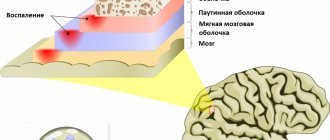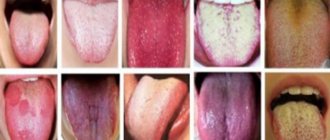Headache is one of the most common symptoms. It can be localized in the frontal, occipital, temporal regions, or be mixed. Many people do not attach much importance to this condition, but it can signal disturbances in the functioning of the cardiovascular and endocrine systems, spine, and brain.
Pain in the temples can occur both in the morning and at any other time and last from 10-15 minutes to several days. In order to understand the reason for its appearance, you should undergo diagnostics. Early detection of pathologies allows you to quickly deal with them and avoid negative consequences.
Causes of pain in the temples
A headache localized in the temporal region can be one-time and associated with negative environmental conditions, colds, lack of sleep or the menstrual cycle. In this case, it does not pose any particular danger and does not require treatment. Recurrent pain in the temples occurs due to disorders in the body. The reasons for its appearance include:
- changes in hormonal levels;
- decrease or increase in intracranial pressure;
- migraine;
- temporal arteritis (inflammation of the arterial walls);
- disorders of nerve channels;
- vegetative-vascular dystonia;
- atherosclerosis.
This unpleasant symptom can also serve as a signal about the development of an oncological process in the brain. In addition, it occurs against the background of circulatory disorders associated with diseases of the cervical spine.
Ear hurts: what to do?
When dealing with ear pain, the main thing is not to self-medicate. When trying to determine the cause of ear pain on your own, it is easy to make mistakes. It is not always clear even where the source of pain is located - in the auditory canal or the tympanic chamber. Therefore, starting treatment without consulting a doctor is dangerous - you may be treating the wrong thing, and the disease, left to itself, in the meantime can take a more severe form.
If the ear pain does not go away within two days or it particularly bothers you, you should consult an ENT specialist. Experienced ENT doctors at Family Doctor will help determine the cause of pain and prescribe an effective course of treatment for both adults and children.
Accurate diagnosis of the causes of pain
To get rid of this unpleasant manifestation, it is necessary to undergo diagnostics and receive appropriate treatment. Despite the fact that modern pharmaceutical companies offer many drugs that have an analgesic effect, stopping a symptom does not mean eliminating the root cause. To forget about pain in your temples forever, you need to understand why it arose. To do this you need to undergo an examination.
MRI of the brain and blood vessels is the most informative and safe diagnostic method used to detect the cause of headaches. Compared to radiography it:
- does not have a negative effect on the body due to the absence of radiation exposure;
- makes it possible to see an accurate picture;
- Can be used on pregnant women, children and elderly patients.
The accuracy of magnetic resonance imaging at MedSeven when examining the brain and blood vessels is about 95%. The duration of diagnosis of pain in the temples is only 15-30 minutes.
Symptoms of pain in the eyes and temples
It is worth noting! Depending on the cause of the development of pain in the eyes and temples, this phenomenon may be accompanied by the following additional symptoms:
- a feeling of heaviness in the head generally or only in the temples;
- insomnia;
- constant fatigue, weakness, tiredness and apathy;
- dizziness;
- changes in blood pressure.
The symptom itself can have a different character and be pulsating, pressing or acute.
MRI at the MedSeven clinic
You can undergo a high-level examination of the brain and other body systems at the MedSeven diagnostic clinic at any time of the day. We guarantee maximum accuracy of results thanks to:
- highly qualified doctors performing MRI;
- using a powerful Philips Intera 1.5 Tesla tomograph;
- responsible approach to the implementation of each procedure.
Surgeons in Israel, Germany, and the USA are guided by images taken in our diagnostic center when prescribing and performing operations. You can make an appointment either by phone or online on the website of our medical center. We work 24 hours a day, seven days a week. After undergoing an MRI, you will receive a conclusion within 15-20 minutes, as well as the opportunity to consult a doctor with a 50% discount.
Get an MRI of the brain in Moscow >>>
The service includes:
- Study
- Disk with image
- Film is paid separately
- Transcription by a radiologist doctor
Should I see a doctor?
Note! If such a symptom appeared for the first time, it was managed to stop with the help of an anesthetic and it does not appear again - there is no reason to worry.
But if pain attacks recur regularly and intensify, you need to visit a therapist.
He prescribes diagnostics , which usually includes urine and blood tests, MRI and CT, angiography of cerebral vessels, and then refers the patient to an ophthalmologist or neurologist (depending on what assumptions about the diagnosis arise).
In the occipital region of the head
In the back of the head, cephalgia occurs when blood pressure increases, the cause of which is osteochondrosis, spondylosis, spondylolisthesis, anomalies in the development of blood vessels in the head or neck.
Severe pain in the back of the head occurs after nervous strain, as a result of spasm of the neck muscles, arteries of the head and neck, and disruption of the outflow of venous blood from the head. It worries patients suffering from occipital neuralgia, vertebrobasilar insufficiency, spinal diseases, and migraines. A sharp headache in the back of the head often occurs with the development of a hypertensive crisis. Sharp, bursting, pulsating headaches in the back of the head are accompanied by pallor of the patient’s face, generalized hyperhidrosis, dry mouth, heart pain and tachycardia.
Chronic arterial hypertension with a slight increase in blood pressure is also characterized by the development of pain mainly in the occipital part of the head. The headache bothers the patient immediately after waking up, intensifies with physical activity, and is often accompanied by swelling of the lower eyelids. Pain is caused by a violation of the outflow of venous blood from the vessels of the head.
Symptoms
When visiting a doctor about pressure in the ears, some patients mention other symptoms accompanying this sensation:
- dizziness;
- ear congestion;
- associated pressure in the head;
- various noises of varying degrees of volume (ringing, clicking, hum, etc.);
- acoasmas (auditory non-speech hallucinations);
- nausea and headaches;
- increased sensitivity to sounds or light.
The presence of these additional symptoms gives the doctor reason to suspect a serious illness and suggest that the patient undergo a comprehensive examination. An otolaryngologist can also offer consultations with other specialists, since the alleged ailments may not be within his competence.
How to quickly relieve an attack of cephalalgia
In cases where a headache does not appear frequently or systematically, and a person definitely does not have diseases that can provoke it, then you can deal with the discomfort on your own. To do this, it is not necessary to use strong medications and call a doctor.
When you feel a severe headache, forget about bad habits, such as smoking and give up alcohol. You should also not apply ice or increase the dose of the analgesic yourself unless your doctor recommends it.
There are a number of actions that need to be taken so that a person with a headache begins to feel better, namely:
- Bring fresh air into the room.
- Free the patient from tight clothing and constricting jewelry, unbutton the shirt collar and raise his legs so that they are higher than head level.
- Reduce indoor lights and sounds to a minimum.
- Give water, it can also be a decoction of soothing and relaxing plants.
- Take a warm foot bath and apply a compress to your head.
- It is necessary to warm a person in cases where the pain intensifies and there is chills.
- Lightly massage the temple area, neck, head, while the person should lie down.
If the above methods do not help within 30 minutes, and only get worse, give the patient an analgesic. If this does not help, then call the ambulance doctors.
Combined with nausea
Severe headache and nausea are signs of migraine, meningitis, and hypertensive crisis.
Often the cause of these symptoms is sinusitis, sinusitis, or intoxication of the body. Nausea, headache, and dizziness are also symptoms of traumatic brain injury and infectious diseases. Patients complain of headache, nausea, weakness at the initial stage of influenza and acute respiratory infection. In this case, the body temperature rises to high numbers. The development of a migraine can be signaled by ripples in the eyes, nausea and headache. With a migraine, the patient's appetite disappears, an aversion to strong odors appears, nausea, irritability, photophobia, and numbness in certain parts of the body occur.
Headache and dizziness also occur when wearing incorrectly selected glasses or lenses or disruption of the vascular system. Headaches and spots in the eyes appear due to fatigue and nervous exhaustion, during weather changes, after stress. These symptoms occur in people who have suffered a traumatic brain injury, spinal injury or disease.
Headache and flashing spots before the eyes appear during a hypertensive crisis. Its variety - hyperkinetic crisis - begins abruptly with headache, nausea, flickering of spots before the eyes and vomiting. The patient feels hot. His sweating and heart rate increase. Trembling is felt throughout the whole body. High blood pressure can cause hypertensive encephalopathy. It manifests itself with the following symptoms:
- Very severe headache;
- Dizziness;
- Nausea;
- Vomiting;
- The flickering of flies in the eyes.
The patient may lose consciousness and die if medical care is not provided in a timely manner.
Headaches that occur in the morning after sleep can be a manifestation of a brain tumor, abusive cephalalgia, tension pain, or migraine. Overuse headache occurs with long-term use of analgesics. It gets worse in the morning. The intensity of the pain constantly changes throughout the day. Overuse headaches are aggravated by stress, mental tension, excessive physical activity, and also by stopping a drug that relieves pain. Abuse cephalgia becomes permanent if the patient suffers from depressive syndrome, is often irritated, and is very tired. Due to constant headaches, a person’s concentration and performance decrease. He sleeps poorly and constantly feels tired.
Treatment
Obviously, treatment for ear pressure can only begin after a diagnosis has been made. Until the cause is identified, the otolaryngologist is unlikely to be able to prescribe medications or take any other action. In addition, if the cause of the disease is beyond his competence, then it will not be possible to do without the help of an appropriate specialist (therapist, surgeon, neurologist, etc.).
The reception is conducted by specialists
Kirillov Evgeniy Sergeevich
Audiologist, otoneurologist
Cost of services
Initial consultation with an audiologist
1200₽
Repeated consultation with an audiologist
1000₽
Cephalgia in children
Pulsating discomfort in a child that is not accompanied by fever, cough and runny nose should alert parents. In such cases, it is important to consult a doctor. Such manifestations may indicate problems with the child’s health.
The phenomenon can be triggered by:
- disease of the vascular system;
- neuralgia;
- migraine;
- injury;
- emotional condition;
- poor nutrition;
- the presence of provoking external factors.
Kinds
Neurologists distinguish the following types of headaches:
- Migraine – caused by a disruption of the vascular system;
- Tension headache - mainly occurs due to excessive tension in the neck, eye muscles, as well as the muscles of the shoulder girdle and scalp aponeurosis, as well as due to chronic stress, depression;
- Chronic paroxysmal hemicrania, cluster headache - can be primary or secondary.
- Headache not associated with damage to brain structures;
- Ambus headache that occurs when taking medications uncontrolled.
There are also headaches after traumatic brain injury, with diseases of the vascular system, and those that occur with intracranial disorders of extravascular origin.
Tensor headaches often occur in women after stress or nervous shock. It goes away in the presence of positive emotions, after drinking soothing herbal teas.
Neurologists do not recommend taking headache pills on your own. Each drug is designed to relieve a specific type of pain and has a number of contraindications. The doctor takes all this into account when prescribing a medicine to a patient.
Make an appointment








